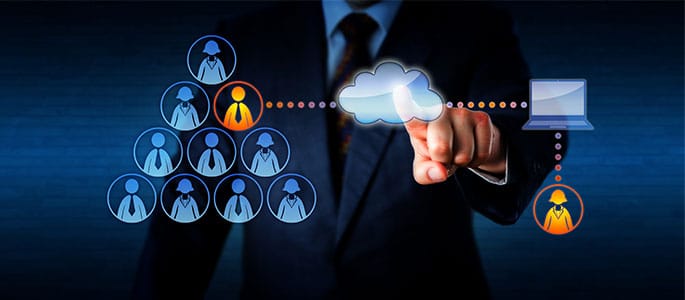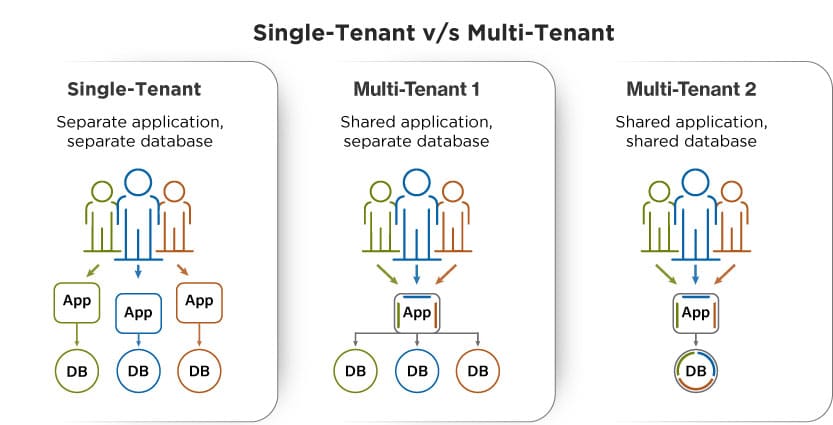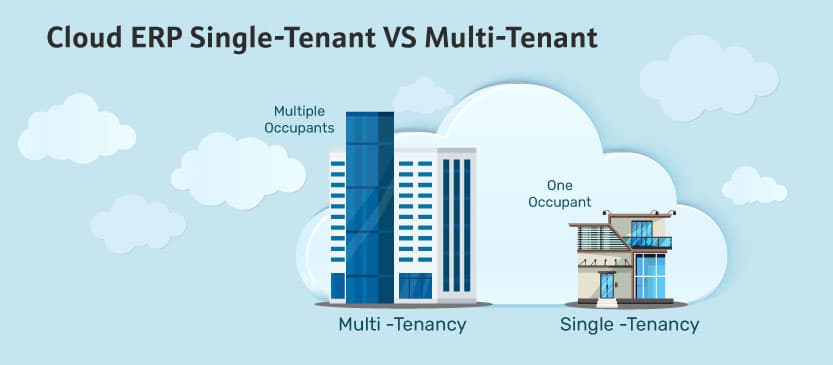
Overview-
Before starting over the topic, let us talk about the word tenant first. The dictionary will suggest its meaning as a person or a group that rents a piece of land for a particular period. Similarly, the sense remains the same when we talk about cloud computing.
Just to compile for a better understanding, cloud ERP is the software as a service (SaaS) model, which provides automated business operating services, accessible over the internet irrespective of the user’s location. Basically, Single Tenant and Multi-Tenant are the two platforms through which the cloud services can be hosted.
The terms single-tenant and multi-tenant are the two different branches of cloud computing (also known as cloud ERP) and differ significantly from each other in several aspects.
Now, a general business question that arises is “On which platform, of the two, should the business operations should be hosted?”
Since you have decided on moving your ERP to the cloud, then before choosing between single-tenant and multi-tenant cloud ERP, it is necessary to be aware of what both offer and what perfectly meets your organization’s needs.
Before that, take a brief look at understanding both the terms by their definitions.

What is single tenant?
A single-tenant ERP solution is the architecture design in which one instance of the application serves a single user only.
The hardware is fitted in the organization itself and an independent database is dedicated to keeping the whole data segregated. So, every user has individual control over the ERP.
Another way to think of it is like, it is simply a single-family home with all the resources in-house, just like the independent bungalows around.
So, issues happening in your neighbourhood wouldn’t impact your house.

A company using this type of ERP solution has its supporting infrastructure and also the freedom to configure & customize the ERP according to the unique needs of the organization.
Additionally, this set-up of cloud ERP serves enhanced privacy, especially for the companies having unique industry verticals and wanting to have tight control over their data.

What is multi-tenant?
In multi-tenant hosting architecture, multiple companies share a common application with different databases at the same time. Sometimes, even a single database is shared by multiple organizations.
To be precise, consider people living in an apartment building, where every resident owns an individual space but shares a single infrastructure of the building & resources. The same thing happens in the case of a multi-tenant cloud ERP solution.
Points they differ on-
Cost–
In single tenant, with the installation of separate resources and setup for every user, proper periodic maintenance is also needed which indirectly adds up to the total expense and the user has to shoulder this increased implementation cost.
In the case of multi-tenant, the software is designed, developed, and deployed on a single server. Also, the implementation and maintenance cost are shared among the users, which makes it a cost-efficient solution.
Data Security-
Isolated data in a single-tenant ERP decreases the risk of a data breach or data loss and hence provides a much safer solution to the customers.
While, in multi-tenant ERP, the infrastructure is shared amongst the tenants– raising the data security concerns.
Data Backup-
A single-tenant architecture offers isolated backups with a premium and easy-to-use recovery option which enhances the control over sensitive data and effortlessly restores the needed previous version.
On the contrary, the multi-tenant application, with every tenant’s data on a single database, makes the backup p & recovery process more complex.
Sometimes, the software even might face downtime due to heavy traffic performing the same set of operations, and hence multi-tenant lags in offering the data backup capabilities to its users, as of now, but it is something which is being worked upon.
Customization-
In the case of a single tenancy, extra control and rights are offered which enables understanding the unique operational needs of the business and customize the complete ERP solution according to them.
As no other tenant shares the application, hence the best strategy can be applied to achieve growth goals.
On the other side, multi-tenant ERP is a shared platform for multiple users that offers universal features for all the tenants and hence allows very little customization of the software to the customers.
Resource Usage-
Single-tenant cloud setup offers storage and access to a single user only, which offers an entire environment & resources dedicated to one client ensuring 100% usage.
Due to this the complete potential of the resources is used for a single business.
As discussed, a multi-tenant cloud setup is like living in an apartment where storage and access are given to multiple tenants.
Just like sharing resources with next-door neighbours, the resources in a multi-tenant setup are distributed among all tenants.
Though the provider keeps control and regularly optimizes resource utilization, due to multiple access points users may face some sort of limitation.
Final Thoughts-
In specific industries where data security is the primary concern, single-tenant ERP proves to be the supreme choice as it doesn’t entertain traffic and serves a single user only. While on the other hand, multi-tenant cloud ERP is the preferred choice for organizations having budget restrictions.
Before closing the topic, no matter what type you choose, ultimately the specific needs of the organization always come first and need to be fulfilled properly. So never miss figuring out which type suits best for your business.
Making the right decision for your business-
At last, the single and multiple tenant both have several pros and cons, but your choice should depend on the needs and ultimate goal of your organization. On one hand, multi-tenant is cost-efficient and comfortable, contrary to it single tenant is reliable and secure.
B2C businesses like small E-commerce companies can opt for the multi-tenant model of application where scalability is much more important. But, for the companies serving industries like pharma, etc., where extra control & better security are of great concern, then there is no other equal like single tenant.
Now you are aware of the differences and features too. But before choosing any of the two, if you still need a more detailed understanding, contact our team of experts, as they are happy to assist you.




















